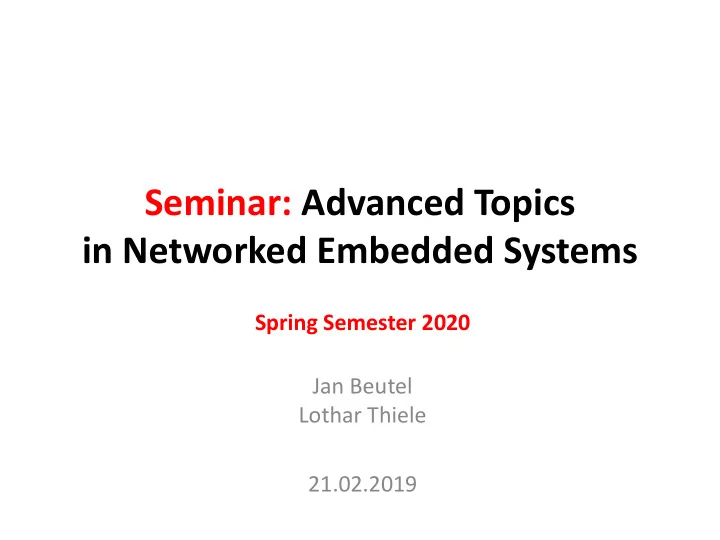

Seminar: Advanced Topics in Networked Embedded Systems Spring Semester 2020 Jan Beutel Lothar Thiele 21.02.2019
Organization (1) • WWW: https://www.tec.ee.ethz.ch/education/lectures/seminar- -advanced-topics-in-networked-embedded-systems.html – Jan Beutel, beutel@tik.ee.ethz.ch – Lothar Thiele, thiele@tik.ee.ethz.ch • Language: English • Biweekly on Tuesday, 13:15 – 15:00 – 18.2.; 3.3.; 17.3.; 31.3.; 21.4.; 5.5.; 26.5. • 2 papers per seminar session (45min each) • Location: ETZ G71.2 • Deadline on participation confirmation (participate or drop out): Thursday, 20.02., 4pm • Contact: thiele@tik.ee.ethz.ch
Organization (2) • Participants: – Master students, PhDs, postdocs – NES PhD students (most are passive listeners) • ECTS points: 2 credits • To get credit points you need to – Actively participate in all seminar sessions – Present 1 paper (possibly together with a colleague) – Review all papers discussed in the seminar
Seminar Goals • Read, learn, discuss on the … Latest technological breakthroughs in NES … How to read a scientific paper … How to review a scientific paper … How to present a scientific paper • NES PhD students (experts in the field) read papers and participate in the discussion
Seminar Topics Learn state-of-the-art in the field of NES • “ Hot” topics on networked embedded systems (NES) – Smart sensors and novel applications – New system designs – Communication and network troubleshooting – Data mining and machine learning – … Paper list is online • Papers selected for the seminar – Recent (mostly published in 2019) – Published at best conferences (IPSN, SenSys , SIGCOMM, …) – Received best paper awards – Represent recent developments in the NES community
Reading a Paper Learn how to read a scientific paper • Take notes while reading • Make sure you understand the paper – What is the main contribution of the paper and how does it connect to what has been done before? – What is the key idea behind the contribution? – What are the assumptions? – What are alternative solutions? – What are the advantages of the solution described in the paper over existing work? (low cost, new capabilities, …)
Paper Review (1) Learn how to review a scientific paper • Reviewers are experts in a given field, are asked to give their opinions on the validity, significance, and originality of the findings presented in manuscripts http://people.ee.ethz.ch/~nescrp/hotcrp/ • All seminar participants are PC (program committee) members – Can review papers and access reviews of other PC members (after having completed your own reviews) • We will register all seminar participants in the system (done already) – Your email address is your username, password will be sent by email
Paper Review (2) • Fill out the review form – Be critical, specific, constructive – Evaluate different aspects of the paper: • Originality • Applicability • Paper structure – Usually not part of a review, but done in the seminar: • Describe possible improvements of the paper in terms of contents and form. • Describe possible extensions and further research opportunities. • Would you accept the paper as a real reviewer? – Why do you think the paper was accepted? – Read on the randomness of the reviewing process: http://blog.mrtz.org/2014/12/15/the- nips-experiment.html • Express your opinion. I t can’t be wrong (by definition ).
Paper Presentation Learn how to present a scientific paper • Slides – are your tools – Contact paper authors and ask for slides – If not available: copy relevant pieces of the paper or use whiteboard • Conference style presentation – Motivate conducted research – Formally state the problem – Present key idea, list contributions and comment on originality – What has been done before and how the paper advances it? – Present main results – Comment on applicability of the results • Rehearse your talk before the seminar (!)
Talk Evaluation • It might be tough to stand in front of a group and receive critics on your presentation skills … but – It has no influence on whether you pass the seminar – It gives you an opportunity to master public speaking and to better know your weak sides – Talk rehearsals are common in almost every research group as part of conference preparation
Seminar Preparations Before Fri Before Fri, 23:59 Tue, 13:15-15:00 @All: Read 2 paper to be @All: Actively @All: Submit your discussed at the seminar and reviews of the papers participate in the make sure you understand to the review system seminar them Fri Mon Tue seminar week Before Fri Before Tue @Speakers: @Speakers: Read paper, request/prepare Read and summarize slides, prepare presentation all reviews. Prepare and rehearse it discussion questions.
Seminar Workflow Reviews’ Discussion x 2 Talk Evaluation summary (20 / 15 (15 / 20 min) (5 mins) (5 mins) min) Evaluation • Receive feedback on your presentation Talk Reviews’ summary • Conference style Discussion • Consolidate reviews presentation • Moderate the discussion • Common opinions? • Formal presentation • Paper content • Different opinions? of the paper • Paper position in the field • Use reviews to • 15 min (one • Paper structure and writing style trigger the speaker) or 20 min • What can we learn from discussion (2 speakers) paper organization? • Reviews • What was the most helpful review (among submitted) and why? • Open questions and future research directions!!
Talk Schedule • Choose one paper you wish to present – List of papers to choose from is on the seminar homepage – Email us your choice by email thiele@tik.ee.ethz.ch no later than Monday, 24.02, 4pm. – First-come-first-serve paper assignment (“bold papers” are not available anymore!) • We will compile a schedule for the seminar – Speakers for the next seminar session will be announced online tomorrow evening (and informed by email) • Inform me if you have any scheduling conflicts – E.g., you plan to miss the seminar due to a conference visit • If you decide to participate in the seminar or drop out, please inform us by Thursday, 20.02., 4pm.
Recommend
More recommend